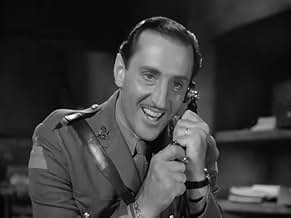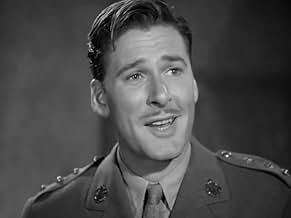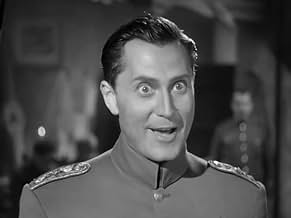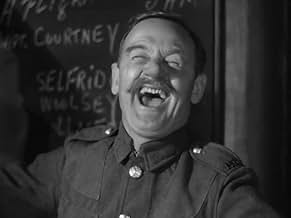VALUTAZIONE IMDb
7,5/10
3558
LA TUA VALUTAZIONE
Aggiungi una trama nella tua linguaBritish flying aces in World War I contend with the harsh realities of war.British flying aces in World War I contend with the harsh realities of war.British flying aces in World War I contend with the harsh realities of war.
- Regia
- Sceneggiatura
- Star
- Premi
- 2 vittorie totali
Sidney Bracey
- Major Brand's Orderly
- (as Sidney Bracy)
Hal Brazeale
- Gregory
- (non citato nei titoli originali)
Tyrone Brereton
- Orderly
- (non citato nei titoli originali)
Richard Deane
- 'B' Flight Replacement
- (non citato nei titoli originali)
Recensioni in evidenza
This is a stirring and exciting story of the courage shown by pilots who know they or their friends will likely be killed on one of their missions, and the anguish their commanders feel when sending them to their deaths. Set on the battlefields of WWI, the plot duplicates the 1930 version starring Douglass Fairbanks, Jr. In fact, whole sequences (especially flying scenes and the climactic attack) were lifted directly from the earlier film. (Note: although the 1930 version was originally entitled "Flight Command," and is occasionally screened under that title by TCM, IMDb also calls it "Dawn Patrol," probably to distinguish it from the 1940 Robert Taylor "Flight Command" about Navy pilots.)
Although it's a close call, I would recommend this later film over its predecessor, for the superior performances of the lead actors. Errol Flynn (as Dick Courtney) was more involving than 1930's Richard Barthelmess, a veteran actor whose performance retains the somewhat stilted quality of the silent film era. While Douglas Fairbanks Jr. was excellent in the 1930 version as pilot Doug Scott, David Niven in the same role positively sparkles in several more light-hearted, even comedic scenes. And although Neil Hamilton played Major Brand well in the original film, at least early on in the story, the role calls for a less-sympathetic performance, and who could be less sympathetic than Basil Rathbone at his sneery best?
Furthermore, current (as of 2012) releases of 1930's "Flight Command / Dawn Patrol" are not as visually clear in all scenes as the later version, and also have a lot of scratchy sounds and low rumble in the soundtrack, which are especially distracting in quieter scenes. Hopefully, remastered versions of both films will someday be available.
Still, this is only nit-picking, as both the 1930 and 1938 versions of "Dawn Patrol" are excellent. But given the choice, go with Flynn and Niven of 1938.
Although it's a close call, I would recommend this later film over its predecessor, for the superior performances of the lead actors. Errol Flynn (as Dick Courtney) was more involving than 1930's Richard Barthelmess, a veteran actor whose performance retains the somewhat stilted quality of the silent film era. While Douglas Fairbanks Jr. was excellent in the 1930 version as pilot Doug Scott, David Niven in the same role positively sparkles in several more light-hearted, even comedic scenes. And although Neil Hamilton played Major Brand well in the original film, at least early on in the story, the role calls for a less-sympathetic performance, and who could be less sympathetic than Basil Rathbone at his sneery best?
Furthermore, current (as of 2012) releases of 1930's "Flight Command / Dawn Patrol" are not as visually clear in all scenes as the later version, and also have a lot of scratchy sounds and low rumble in the soundtrack, which are especially distracting in quieter scenes. Hopefully, remastered versions of both films will someday be available.
Still, this is only nit-picking, as both the 1930 and 1938 versions of "Dawn Patrol" are excellent. But given the choice, go with Flynn and Niven of 1938.
DAWN PATROL was a forerunner of the "men facing war" kind of dramas that became a steady source of entertainment in books and films of the decades that followed, particularly after WWII.
But this takes place during World War I in 1915, when aviation was still young and men in the flying machines were sent into battle against greater odds than anyone could imagine.
Basil Rathbone plays the commander breaking under pressure who has to see young men under his command die in battle against the Germans. He is delighted to be relieved of his command by the young flier who has been chiding him for sending inexperienced men into battle--Errol Flynn.
Flynn soon finds himself hounded by the same sort of pressures facing Rathbone. His best friend (David Niven) is a fun loving pal who has a change of heart when his younger brother (well played by Morton Lowry), turns up for immediate duty despite a scant amount of training. Under Flynn's orders, the boy goes into battle the following day and is killed. This event sets up the dramatic conclusion which has Flynn willing to sacrifice himself and single-handedly take on a most dangerous mission across enemy lines.
Edmund Goulding keeps the story going from one excellent scene to another and all of the performances are first rate. Donald Crisp is less stuffy than usual in a good supporting role.
But it's Errol Flynn who makes the strongest impression in a role that calls for some fine moments of acting. His emotions seem genuine and his performance is crisp and mature. Indeed, one of his best performances in a well written role.
The ultimate message of the film is the anguish and futility of war and it comes across without being preachy. Definitely a Flynn film that is well worth watching.
But this takes place during World War I in 1915, when aviation was still young and men in the flying machines were sent into battle against greater odds than anyone could imagine.
Basil Rathbone plays the commander breaking under pressure who has to see young men under his command die in battle against the Germans. He is delighted to be relieved of his command by the young flier who has been chiding him for sending inexperienced men into battle--Errol Flynn.
Flynn soon finds himself hounded by the same sort of pressures facing Rathbone. His best friend (David Niven) is a fun loving pal who has a change of heart when his younger brother (well played by Morton Lowry), turns up for immediate duty despite a scant amount of training. Under Flynn's orders, the boy goes into battle the following day and is killed. This event sets up the dramatic conclusion which has Flynn willing to sacrifice himself and single-handedly take on a most dangerous mission across enemy lines.
Edmund Goulding keeps the story going from one excellent scene to another and all of the performances are first rate. Donald Crisp is less stuffy than usual in a good supporting role.
But it's Errol Flynn who makes the strongest impression in a role that calls for some fine moments of acting. His emotions seem genuine and his performance is crisp and mature. Indeed, one of his best performances in a well written role.
The ultimate message of the film is the anguish and futility of war and it comes across without being preachy. Definitely a Flynn film that is well worth watching.
THE DAWN PATROL, Errol Flynn's final film of his busiest year as an actor (1938), is a fascinating counterpoint to his usual swashbuckling and light comic roles. A remake of Howard Hawks' 1930 classic, this is a tale of war-weary WWI aviators, called upon to risk their lives daily, in broken-down aircraft, on missions they consider impossible (a timeless war theme that would reappear in such WWII classics as COMMAND DECISION and TWELVE O'CLOCK HIGH). Directed by WWI veteran Edmund Goulding, best known for his big-budget romances (GRAND HOTEL), the film counterpoints the gritty, harsh realities on the ground with the nearly surreal quality of early air battles, as bi-planes with open cockpits whirl and swoop like insects, and enemy airmen would occasionally drop out possessions of dead pilots over airfields, in a chivalrous gesture.
Fellow pilots Courtney and Scott (portrayed by real-life friends Flynn and David Niven, again showing the rapport they had demonstrated so effectively in 1936's THE CHARGE OF THE LIGHT BRIGADE) are battle-tested veterans, hell-raising survivors of a squadron decimated by the war. Seeing a constant influx of 'green' kids replacing lost friends, and knowing too well that the rookies' inexperience will quickly cost them their lives, the pair vent their anger against their commander, the coldly 'by-the-book' Maj. Brand (in a remarkable performance by frequent Flynn nemesis, Basil Rathbone). Courtney constantly condemns and belittles Maj. Brand, accusing him of placing 'The Mission' over the lives of the men under his command, which makes Courtney a hero in the eyes of the fliers.
Finally, Brand cracks, and is approved for reassignment, and Courtney is chosen to replace him. In a powerful scene, Brand lets his cold 'facade' down, and reveals, bitterly, to the younger man that seeing his men sent on suicide missions, daily, had literally crushed him. Unknown to the squadron, Brand had constantly begged HQ to ease up, but had been 'shot down' each time, as the missions were essential. "Now it's YOUR turn," Brand sneers, "See how YOU enjoy it!"
Brand's words are prophetic, as Courtney quickly discovers himself in the same situation, as the despised scapegoat, with Scott assuming the role of spokesperson and savior to the squadron. And the most dangerous mission yet has just come down from HQ...
DAWN PATROL is a powerful film, with great performances from the entire cast, particularly Flynn, who had often begged the WB to give him roles beyond his 'swashbuckler' image. The critical praise it garnered proved Flynn's versatility as an actor (although public demand would keep him 'locked' into adventure films), and raised David Niven up to 'star' status.
It remains one of the BEST films about the 'Great War', and shouldn't be missed!
Fellow pilots Courtney and Scott (portrayed by real-life friends Flynn and David Niven, again showing the rapport they had demonstrated so effectively in 1936's THE CHARGE OF THE LIGHT BRIGADE) are battle-tested veterans, hell-raising survivors of a squadron decimated by the war. Seeing a constant influx of 'green' kids replacing lost friends, and knowing too well that the rookies' inexperience will quickly cost them their lives, the pair vent their anger against their commander, the coldly 'by-the-book' Maj. Brand (in a remarkable performance by frequent Flynn nemesis, Basil Rathbone). Courtney constantly condemns and belittles Maj. Brand, accusing him of placing 'The Mission' over the lives of the men under his command, which makes Courtney a hero in the eyes of the fliers.
Finally, Brand cracks, and is approved for reassignment, and Courtney is chosen to replace him. In a powerful scene, Brand lets his cold 'facade' down, and reveals, bitterly, to the younger man that seeing his men sent on suicide missions, daily, had literally crushed him. Unknown to the squadron, Brand had constantly begged HQ to ease up, but had been 'shot down' each time, as the missions were essential. "Now it's YOUR turn," Brand sneers, "See how YOU enjoy it!"
Brand's words are prophetic, as Courtney quickly discovers himself in the same situation, as the despised scapegoat, with Scott assuming the role of spokesperson and savior to the squadron. And the most dangerous mission yet has just come down from HQ...
DAWN PATROL is a powerful film, with great performances from the entire cast, particularly Flynn, who had often begged the WB to give him roles beyond his 'swashbuckler' image. The critical praise it garnered proved Flynn's versatility as an actor (although public demand would keep him 'locked' into adventure films), and raised David Niven up to 'star' status.
It remains one of the BEST films about the 'Great War', and shouldn't be missed!
Clear eyed depiction of the cost and dangers for bombers during wartime. Errol Flynn is very good, a reminder that he was excellent not only in period pictures and westerns but quite capable in modern dress dramas. Strong supporting cast helps with Basil Rathbone standing out as a man who understands but is troubled by the weight of his duty even while others do not and is compassionate enough when the that weight has shifted to offer solace. David Niven's star moved much higher with his performance here, it would still be a few years before he moved into the top ranks but he was done with unimportant roles from this point on. Goulding's direction is steady and assured.
I don't have a lot to say about this movie. Errol Flynn is excellent as Captain Courtney, and the rest of the cast is excellent in their roles. That didn't surprise me. What surprised me was two things. First, how the British flying aces in World War I contend with the harsh realities of war, specifically the deaths of their friends and the decisions that had to be made to send more men to their deaths (excellently portrayed by Basil Rathbone as Major Brand). Whats most impressive, however, is how engaging the air sequences were. They were ahead of their time and they hold up rather well today. I just saw Pearl Harbour, and I would say the Dawn Patrol is more exciting. It holds up well today, and if you get a chance, give it a watch. 8 out of 10.
Lo sapevi?
- QuizAt the time this movie was filmed, Errol Flynn and David Niven shared a rented house at Malibu, which they named "Cirrhosis-by-the-Sea" because of all the hard drinking and sex they were having with several women.
- BlooperThe amount of oil and dirt on Courtney's face changes several times between scenes. The most obvious is when he goes up stairs to console another pilot who has lost a friend. As he goes up his face is slightly dirty, as he enters the room it is noticeably dirtier and when he comes back down it is much cleaner.
- Citazioni
Phipps: [Opens package dropped by enemy plane] It's his helmet and goggles. It means a very gallant gentleman died this afternoon. And for what? What have all these deaths accomplished? So many fine chaps have died in this war and are going to die in future wars.
[pause]
Phipps: That's all, gentlemen.
- ConnessioniFeatured in Special Effects: Anything Can Happen (1996)
- Colonne sonorePoor Butterfly
(1916) (uncredited)
Music by Raymond Hubbell
Lyrics by John Golden
Played on the Grammaphone
I più visti
Accedi per valutare e creare un elenco di titoli salvati per ottenere consigli personalizzati
- How long is The Dawn Patrol?Powered by Alexa
Dettagli
- Tempo di esecuzione1 ora 43 minuti
- Colore
- Mix di suoni
- Proporzioni
- 1.37 : 1
Contribuisci a questa pagina
Suggerisci una modifica o aggiungi i contenuti mancanti

Divario superiore
By what name was Missione all'alba (1938) officially released in India in English?
Rispondi

































